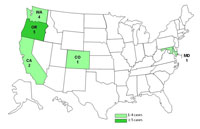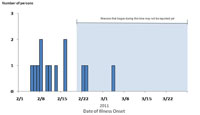Investigation Update: Multistate Outbreak of Salmonella Panama Infections Linked to Cantaloupe
March 29, 2011
On this Page
Today's Highlights
- As of March 29, 2011, 13 persons infected with the outbreak strain of Salmonella Panama have been reported from Oregon (5 cases), Washington (4 cases), California (2 cases), Colorado (1 case) and Maryland (1 case).
- Collaborative investigative efforts of state, local, and federal public health and regulatory agencies have linked this outbreak to eating cantaloupe. On March 22, 2011, Del Monte Fresh Produce N.A., Inc. voluntarily recalled cantaloupes. Consumer should not eat recalled cantaloupes and restaurant and food service operators should not serve them. For more information, please see the Del Monte press release on FDA’s website.
Introduction
CDC is collaborating with public health officials in a number of states, including Oregon, Washington, California, and Maryland and the U.S. Food and Drug Administration (FDA) to investigate a multistate outbreak of Salmonella Panama infections. Investigators are using DNA analysis of Salmonella bacteria obtained through diagnostic testing to identify cases of illness that may be part of this outbreak.
As of March 29, 2011, 13 persons infected with the outbreak strain of Salmonella Panama have been reported from Oregon (5 cases), Washington (4 cases), California (2 cases), Colorado (1 case) and Maryland (1 case). Reported dates of illness onset range from February 5, 2011 to March 4, 2011. Ill persons range in age from less than 1 year old to 68 years old, with a median age of 12 years old. Sixty-two percent are male. Among ill persons, three have been hospitalized and no deaths have been reported.
The outbreak can be visually described with a chart showing the number of people who became ill each day. This chart is called an epi curve. Illnesses that occurred after February 21, 2011 might not be reported yet due to the time it takes between when a person becomes ill and when the illness is reported. This takes an average of 2 to 3 weeks. Please see the Timeline for Reporting of Salmonella Cases for more details.
Investigation of the Outbreak
Collaborative investigative efforts of state, local, and federal public health and regulatory agencies have linked this outbreak to eating cantaloupe. Twelve of 13 ill persons reported eating cantaloupe in the week before illness. Eleven of these 12 ill persons ate cantaloupes purchased at eight different locations of a national warehouse club. Information gathered with patient permission from membership card records helped determine that ill persons purchased cantaloupes sourced from a single farm. Product traceback information indicates these cantaloupes were harvested from single farm in Guatemala. FDA is working closely with CDC, authorities in states where illnesses have occurred and the firms involved to investigate the source of the contamination.
Recall Information
On March 22, 2011, Del Monte Fresh Produce N.A., Inc. voluntarily recalled 4,992 cartons of cantaloupes, because they have the potential to be contaminated with Salmonella Panama. The cantaloupes were distributed through warehouse clubs in Alaska, California, Colorado, Idaho, Montana, Oregon, and Washington.
The recalled products consist of cartons of cantaloupes, each containing 4 plastic mesh sleeves with 3 cantaloupes per sleeve that were available for sale between March 10 and March 21, 2011. The cantaloupes, grown in and shipped from Del Monte Fresh’s farm Asuncion Mita in Guatemala, have a light brown color skin on the exterior with orange flesh. The recalled cartons of cantaloupes are dark brown cardboard with the “Del Monte” logo in red lettering and “cantaloupes” in yellow lettering on a green background. The cantaloupes have the lot codes: 02-15-24-10, 02-15-25-10, 02-15-26-10 and 02-15-28-10. No illness has been linked to cantaloupes from other sources.
Clinical Features/Signs and Symptoms
Most persons infected with Salmonella develop diarrhea, fever, and abdominal cramps 12 to 72 hours after infection. The illness usually lasts 4 to 7 days, and most persons recover without treatment. However, in some persons, the diarrhea may be so severe that the patient needs to be hospitalized. Salmonella infection may spread from the intestines to the bloodstream, and then to other body sites and can cause death unless the person is treated promptly with antibiotics. The elderly, infants, and those with impaired immune systems are more likely to have a severe illness from Salmonella infection. More general information about Salmonella can be found here.
Advice to Consumers, Retailers, and Others
Contaminated cantaloupes may still be in grocery stores and in consumers' homes.
- Consumer should not eat recalled cantaloupes and restaurant and food service operators should not serve them.
- Consumers who have cantaloupes in their homes can check with the place of purchase to determine if the fruit came from this company.
- Recalled cantaloupes should be disposed of in a closed plastic bag placed in a sealed trash can. This will prevent people or animals from eating them.
- Persons who think they might have become ill from eating possibly contaminated cantaloupes should consult their health care providers.
- Consumers and food preparers should wash their hands before and after handling any melon. Wash the surface of melons such as cantaloupes, and dry them with a clean cloth or paper towel before cutting. Promptly refrigerate cut cantaloupe.
Additional Resources
- Del Monte Press Release
- FoodSafety.gov
- General Information: Salmonella
- Description of the Steps In a Foodborne Outbreak Investigation
- CDC's Role During a Multi-State Foodborne Outbreak Investigation
CDC's Role in Food Safety
CDC leads federal efforts to gather data on foodborne illnesses, investigate foodborne illnesses and outbreaks, and monitor the effectiveness of prevention and control efforts. CDC is not a food safety regulatory agency but works closely with the food safety regulatory agencies, in particular, with FDA and U.S. Department of Agriculture’s Food Safety and Inspection Service. CDC also plays a key role in building state and local health department epidemiology, laboratory, and environmental health capacity to support foodborne disease surveillance and outbreak response. Notably, CDC data can be used to help document the effectiveness of regulatory interventions.
Get email updates
To receive email updates about this page, enter your email address:
Contact Us:
- Centers for Disease Control and Prevention
1600 Clifton Rd
Atlanta, GA 30333 - 800-CDC-INFO
(800-232-4636)
TTY: (888) 232-6348 - New Hours of Operation
8am-8pm ET/Monday-Friday
Closed Holidays - cdcinfo@cdc.gov




